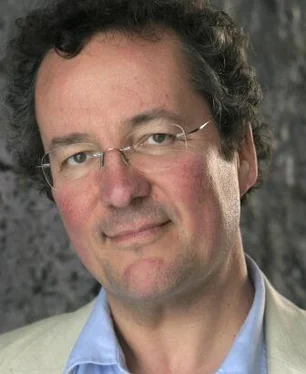‘And was he the guilty man?’
Munio gave him a steady stare. ‘Who can say? Only God knows a man’s heart. For me, it was enough that from that day onwards he became an indefatigable seeker of the truth. The fact that someone had dared to accuse him made him realise how thin is the covering of honour that envelopes even the highest in the land. No family is free of crimes. The French King himself has shown that. Consider his daughters.’
Baldwin knew what he meant. Some ten years before, the French Crown had been rocked by the wives of King Philip the Fair’s two sons; both young women had been found guilty of adultery. Their lovers had been castrated and burned alive, of course, and the two guilty women were incarcerated at the castle of Chateau-Gaillard. One died of cold in the first winter, but the other was still living, so Baldwin had heard, in a monastery.
‘Certainly no family is free of the stain,’ he agreed quietly.
‘Yes. So it matters not what a man was , but how he behaves now,’ Munio said with satisfaction.
Baldwin let out a breath slowly. He was sure that Munio had divined his past life in the Templars somehow – although now he thought about it, his behaviour regarding Matthew had been less than discreet. If he had shouted his interest in the old Templar from the Pesquisidor ’s roof, it would scarcely have been less plain.
If Munio was to ask Baldwin about his past, the knight was not sure what his position would be.
‘There were always many Templars here,’ Munio continued thoughtfully. ‘I met them and grew to respect them in Oxford. When I returned here, I met even more of them. They came here on pilgrimage, for they were constant travellers and keen to ensure that their souls were as pure as they could make them. That was my impression of Templars: that they were honourable and devout. I could not censure such men. Even Matthew, who had suffered so much, he deserved better than to be left desolate as he was.’
‘But as you say, a religious man who has been killed at the end of a long life is less cause for vengeance than a woman whose life was ended so early,’ Baldwin ventured.
‘No, not less cause, but no more cause. I believe that justice must reflect equally on all. It is not a view which meets with universal approval,’ Munio said, and shrugged, ‘but it serves for my personal creed. Thus, if you go to Tomar, I would like you to spend the same amount of time seeking the killer of Joana as the killer of Matthew. Would you swear to do that?’
‘Yes. But I may learn that they are innocent, too. What then?’
‘The innocent go free.’
‘Yes, but if they are guilty …’ Baldwin spread his hands helplessly. ‘What would you have me do? I cannot murder them myself. That would make me no better than them.’
‘True, and if they have joined a religious Order they are safe from our justice,’ Munio agreed. Then he leaned on his elbows. ‘But tell me, how would the Mestre of a religious convent respond if it was shown to him that his latest recruit was a murderer and violator of innocent Catholic women? Or that he was the executioner of a Templar knight who was already so reduced in his position as to be forced to beg in the streets of Compostela?’
Baldwin drew in a breath sharply. ‘Any Master would surely feel that the culprit should lose his habit. He might insist on the vow of obedience, and demand that the man should leave and join a religious Order with a vastly more onerous round of duties.’
‘Yes,’ Munio said with satisfaction. ‘And then, if the man was innocent of the crime, God will ease his toil, because if the man was so devout as to want to join an Order to serve God, he would be comfortable no matter to which Order he was sent. But if he was guilty and had expected to escape, how much more painful would be his punishment. I have always thought that, contrary to belief, the Church is not so generous to failed priests as our secular society is. We only hang a man. The Church keeps him imprisoned for ever.’
‘You will allow me to go with your blessing?’
‘Yes. But not Simon, friend.’
Baldwin felt as though he had been slammed in the belly. ‘You mean to hold him hostage?’ he asked, choked.
Munio looked up, hurt. ‘I called you “friend” because that is how I consider you, Don Baldwin. No, my reservation about Simon is caused by his illness. My wife says that he should not travel, and I am inclined to agree with her. Look at how he was today when you saw him.’
Baldwin was unconvinced, but when Munio gave a whistle, his wife came to join them both, and she argued forcefully and vociferously that Simon should remain.
‘He is not well enough to travel, Sir Baldwin. Look at him! You may return and see him at any time you wish, for I doubt you will wake him. He was close to death, and to take him on a voyage now would be fatal. Think of the perils which afflict the healthy at sea, from fevers to sicknesses. If he were merely to become seasick, his body could not cope. Please consider him.’
Baldwin was aware of a horrible feeling of separation. In the past he had always had an able man-at-arms beside him, his Sergeant from the Templars, Edgar, but Edgar was back at the manor near Cadbury with Jeanne, Baldwin’s wife. He had preferred to know that she and Richalda, their daughter, were safe in case of an armed gang, or even the risk of war. Edgar was competent and entirely capable. He would see to it that Jeanne and Richalda were safe.
At all those times when Edgar had not been with him, Baldwin had been pleased to have the sturdy, stolid Bailiff at his side. Simon was resourceful, bright, and a doughty fighter when one was needed.
‘I do not know if I can do this without him,’ he said slowly.
‘Of course you can,’ Munio said briskly. ‘You’ll find these men. If you don’t, persuade the Mestre at Tomar to help you find them. These men all appear to be heading in the direction of the town. If they have already arrived, good, and the Mestre can see to it that they pay for their crimes; if they have not arrived, so much the better, because you can save the Order from recruiting dishonourable souls who should never have been considered for a holy fort.’
Baldwin shook his head doubtfully. To travel so far, without friend, without companion, without even the power of the law to support him, felt foolish in the extreme. Better, perhaps, to wait until Simon was quite recovered, in which case he could have a friend to count on.
How long would that take, though? Days? Weeks? The men already had a good head-start on him. Ramón had left on the morning of Matthew’s death. That was four days ago, now. Even sailing instead of riding on horseback took some time, and these men were some hundred miles away by now. A longer delay might mean their escaping.
‘How long will it take to get to Tomar?’ he asked.
‘The sooner you start, the sooner you’ll get there,’ Munio said unsympathetically, then chuckled. ‘I think three to four days to sail down the coast, then another two or three to travel inland, if you can make good time. I can’t help much, but I can at least give you some currency. I have some libras and soldos which you can use.’
Baldwin stood. ‘I should pack and make my way to the coast if I am to catch my ship in the morning.’
The next three days were, for Simon, unremittingly tedious. Always an energetic man, he loathed lying about. His indolence was a strain on himself and, he admitted, on all about him, but he couldn’t help it. When things grew too much for him, he couldn’t curb his tongue.
If he had been in England, in some part of Dartmoor with a pair of miners, he would at least have felt more or less at home, or if he had been in a city like Exeter, where he knew many people and could count on their dropping in to chat, it would have been different, but here, with all the language difficulties, he felt awful, as if he was being imprisoned by people who could not understand him. Even if he had a simple request, the servants would tend to seek Doña Margarita, or Munio himself, rather than take it upon themselves to try to understand his words. He could ask for water or wine, and one grizzled old devil appeared to comprehend fully when he demanded bread, but that was about it.
Читать дальше












